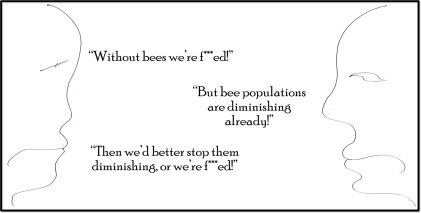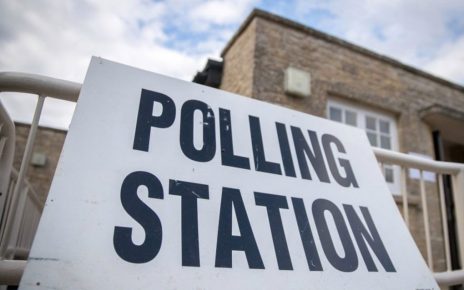1: Ringing the alarm
The environment.
Hm.
Let’s not get alarmist.
2: Soil
So… humanity’s likely to run out of soil within 40 to 60 years1.
Well, that could get pretty grim, I imagine.
Starving children. Desperate families. Mass migrations.
Not a pretty picture.
Have you seen the film The Road2?
3: Water
Water is also an issue.
Changing weather patterns – driven by global warming – will leave up to a quarter of the world’s population without much in the way of water within the next 20 to 30 years….3
More than 2 billion people without enough water?
What will they do?
How will they react?

4: Resource war
These same weather patterns put at risk the sources of some of the world’s great rivers – like the Ganges and the Nile. With restricted water, what if India uses most of the water before it gets to Bangladesh? What if The Grand Ethiopian Renaissance Dam, now nearing completion, creates droughts further downstream in Sudan and Egypt? 4
Climate change and resource wars are likely to go hand in hand.
5: Sand
Over-cultivation, soil degradation and climate warming will create new deserts and dust bowls, while the existing ones are already expanding5.
That’s less food for some of us.
That’s our ribs sticking out like the bull bars of a jeep.
That’s our cheeks sucking in until our faces look like skulls.
It’s not a good look.
It’s not a look you’d want to see among your family and friends.
Not a look you’d want to see among anyone’s family and friends.

6: Sea levels
Meanwhile, as sea levels rise, other places will drown6.
This will push human populations into a narrower and narrower band of habitable Earth.
Less area to live in, less space to grow food.
“What about the melting icecaps?” you might ask. “Won’t that free up some land?”
Nice try – and not a bad question.
But no.
The melting icecaps won’t release much land. Not much that’s much use.
Not much that’s coated with precious soil, deposited and leavened over millennia. Not much you can grow stuff on.
And there’s no land anyway, under the ice sheets of the Arctic7.
7: Us lucky few
“There’ll be a lucky few, though, won’t there? In places like New Zealand or the far north of Europe and Asia? Where the super-rich are already buying their escape-pod homes?”
Well, yes… and no.
Even in the habitable regions that we’re left with the weather will get tricky. As the planet hots up, extreme weather events will become more frequent8.
Hurricanes and blizzards.
Floods and droughts.
Little of which can be thought of as exactly comfortable or pleasant.
All of which will damage food supplies.
8: Jammed in
And the lucky few in their New Zealand mansions will be cramped in. And there’ll be others who want to join them… And, when we’re all jammed in (allowing for resource wars and migration wars and wars simply to hold onto ‘our share’), what happens when the climate gets even hotter?

9: The tipping point
The scenarios of soil loss, sea level rises, extreme weather and expanding deserts are unavoidable if we continue as we are, just tinkering at the edges, setting ourselves palliative goals for 2035 or 2040 or 2050…
And we haven’t even talked about tipping points and feedback loops.
Climate Change Feedback Loop 1: Ice sheet loss
This one’s grim: Global warming melts the polar ice sheets, reducing the white ice which reflects sunlight back into space. So the heat of the sun stays down here. So more ice cap melts. So more heat stays down here…
No wonder increases in the speed of climate change and sea level rises keep surprising our scientists9.
Climate Change Feedback Loop 2: Methane
Methane is nasty stuff. Released by the melting permafrost, it contributes powerfully to global warming… so we warm quicker… so more permafrost melts… so more methane is released… so we warm more…10
You know where this is heading…
Climate Change Feedback Loop 3: Water vapour
Water vapour is a potent greenhouse gas. As the climate warms water evaporates and water vapour in the atmosphere increases. This exacerbates the greenhouse effect, meaning the climate gets hotter, leading to more evaporation. More water vapour then traps more heat…11
Who would have thought that water would become the climate’s Achilles’ Heel?
Climate Change Feedback Loop 4: Bush fires
The increasing occurrence of bush fires, such as those in California in 2017-2019 or Australia 2019-2020, is made more likely by global warming. It’s not that global warming is the cause of any specific fire, but it facilitates such fires and increases the likelihood of severity.
These fires add more CO2 to the atmosphere while decimating plant stocks which would naturally absorb it.
So the climate gets warmer faster.
So there’re even more bush fires.
So the climate gets warmer even faster…
So the cycle continues (and will continue, unless we somehow put it on ‘pause’) – until there’s no more forest or bushland left to burn.
Climate Change Feedback Loop 5: War
Global warming will cause resource wars between or even within nations – wars which will only damage environments and exacerbate the global warming process. The impacts of further warming may then cause further war, and so on, and so on, contributing to further environmental damage and warming…
That’s climate change for you. A potentially escalating process.
Climatologists and scientists have been warning us for years.
It’s hardly a bundle of laughs.
10: The future
You ask: How quickly will these feedback loops kick in?
Answer: They’ve already begun.
You ask: How quickly will they accelerate climate change?
Answer: That’s still an open question – but things are looking profoundly risky.
You ask: When will life start to become difficult?
Answer: It’s already getting difficult for some in the harsher climates of today’s world – and it will affect billions more of us within the lifetime of young. So the young should be striking. It’s more than understandable… It’s essential.
11: Extinction
And we haven’t yet mentioned the extinctions12 …
Life is precious.
Species are precious.
And species depend on one another.
And, talking of dependency, one type of creature is more important to us than almost any other: the pollinators.
12: Dwindling bees
If the bees and the beetles and the wasps dwindle13, we all dwindle.
Do you know what ‘dwindling’ means when it comes to around 8 billion people14?
It means millions of people not surviving.
Maybe hundreds of millions.
A billion = 1,000,000,000
8 billion = 8,000,000,000
What reduction will allow the rest to survive?

13: In the beginning
So… environmental breakdown and climate change…
Together they’ll result in families, in young men and women, in elderly people and children going hungry, becoming desperate… and then, and perhaps with ever greater frequency, dying.
It’s happening already.
The push to migrate that we’re seeing all across the world doesn’t come from nowhere. Take a look at people living where it’s becoming too hot or dry to grow food – or where the environment is already seriously degraded… or where the weather, particularly rainfall, is becoming erratic…
Would you want to hang around in such environments?
Climate change is happening.
And the danger is: it could be exponential.
14: Sanity
So is it alarmism to be afraid for our future?
Is it fear-mongering to demand radical preventative action against climate change?
Is it panic-stirring to demand plans to protect us from the worst of it?
No.
Not at all.
It’s sanity.
www.ethicalintelligence.org “The ethics of common sense”
Twitter & Facebook: @EthicalRenewal
References/Notes
- See ‘What If the World’s Soil Runs Out?’, John Crawford, Time Magazine, Dec 2012.
- The Road, Dir. John Hillcoat, 2009, based on the 2006 novel by Cormac McCarthy. I sunk so deeply into depression while watching this film that I had to be carried out of the cinema.
- See World Resources Institute ‘Global Water Risk Atlas’: https://www.wri.org/news/2019/08/release-updated-global-water-risk-atlas-reveals-top-water-stressed-countries-and-states.
- See ‘India’s holiest river is drying up’ by Paul Solpek, National Geographic, Aug 2019: https://www.nationalgeographic.com/culture/2019/08/india-ganges-river-drying-up/ Also ‘250 million people rely on the Nile for water that may not exist by 2080’ by Zoë Schlanger (https://qz.com/1709757/climate-change-threatens-the-niles-critical-water-supply/), where Schlanger notes that climatologists predict Egypt facing national water shortages by 2025. That’s in virtually no time at all…
- Areas which will be affected are those surrounding the Mediterranean, south-eastern Africa, southern Australia, Guatemala, El Salvador, Honduras and Nicaragua. See https://www.ipcc.ch/srccl/: the IPCC Special Report on climate change, desertification, land degradation, sustainable land management, food security, and greenhouse gas fluxes in terrestrial ecosystems. Again, resource wars and mass migrations are likely.
- A 1m sea-level rise would affect 6 million people in Egypt, with 12% to 15% of agricultural land lost, 13 million in Bangladesh, with 16% of national rice production lost, and 72 million in China and “tens of thousands” of hectares of agricultural land (Nicholls and Leatherman, 1995). Yet when the Earth was last the average global temperature it’s now reached, there was a sea level rise of 6 – 10 metres. Worse than this, when greenhouse gasses were last this high (Pliocene Era, 2.6 to 5.3m years ago) sea level was approx. 20 metres higher. Also worrying: research is now showing that even the rather terrifying estimates of the IPCC for sea level rises were moderate: https://www.nasa.gov/feature/goddard/2018/new-study-finds-sea-level-rise-acceleratinge. The speed with which the sea level is rising appears to be accelerating… For some nations a five metre rise could lead to a 20% loss in agricultural land, as only part of the damaging impact on productivity due to climate change.
- There is land under the ice which covers Greenland – but it won’t be much use as farmland.
- See ‘Extreme Weather and Climate Change’ in Climate Change, What Everyone Need To Know by Joseph Romm, 2018.
- See IPCC in 2017 on rate of sea level rise vs. NASA in 2019.
- See NASA ‘Unexpected future boost of methane possible from Arctic permafrost’: https://climate.nasa.gov/news/2785/unexpected-future-boost-of-methane-possible-from-arctic-permafrost/
- See Andrew Dessler of Texas A&M University, 2019: https://earthsky.org/earth/andrew-dessler-says-water-vapors-role-in-warming-now-understood. Dessler says, “You get twice the warming with the water vapor feedback than you would without the water vapor feedback.”
- See Aylin Woodward, ‘18 signs we’re in the middle of a 6th mass extinction’, Business Insider: https://www.businessinsider.sg/signs-of-6th-mass-extinction-2019-3/
- 84% of crop species depend on insect pollinators, but many are going extinct: https://www.nationalgeographic.com/animals/2020/02/bumblebees-going-extinct-climate-change-pesticides/
- Approximate world population by the time you read this.
© Luke Andreski 2020. All rights reserved.




